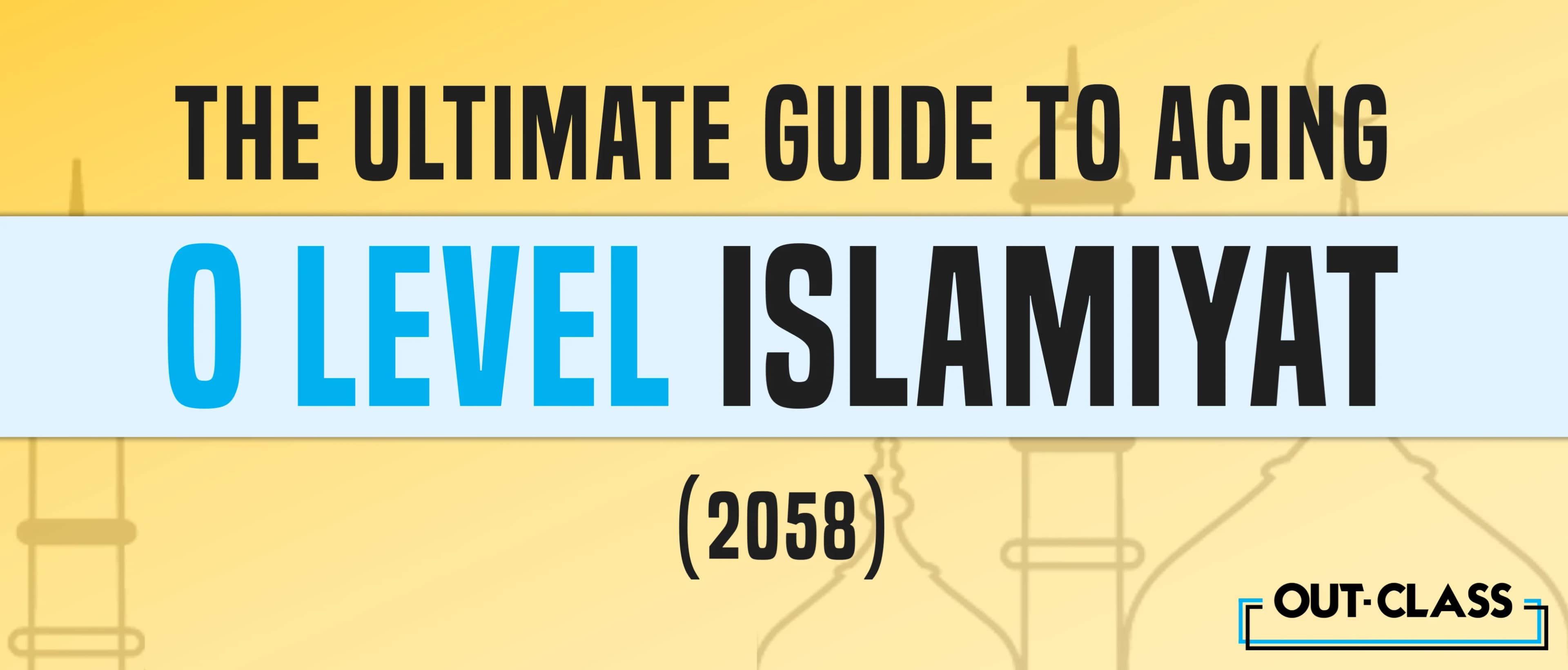If there is anything that truly makes a student’s hair stand on end, it’s exams. And not just any exam - the CAIE O Level Islamiyat exam!
With an extensive syllabus and limited time, many O Level students take shortcuts (i.e. barely skimming through key topics or just attempting O Level Islamiyat past papers), which causes their grades on the day of the CAIE to dip.
Luckily, there are several ways you can avoid this. By taking the following steps, you can be well on your way to acing your O Level Islamiyat exam. So, let’s get started!
*Note: There are no significant changes in the Islamiyat 2058 syllabus 2024.
Steps to ace your O Level Islamiyat exam:
Let's expand more on these steps!
Step 1 – Understanding the O Level Islamiyat Exam Format
Getting familiar with the O Level exam format can help you be prepared as you will know what to expect.
First things first, the syllabus code for O Level Islamiyat is 2058. According to Cambridge International Examinations, the O Level Islamiyat exam will be divided into two parts: Paper 1 and Paper 2. Let’s explore the contents of each:
Paper 1:
- Major Themes of the Qur’an:
These relate to the themes of God in Himself, God's relationship with the created world and God's Messengers.
Candidate should explore the major theme or themes of the Quran in that passage and its importance in the lives of Muslims today.
*Pro Tip: Give reference to the Arabic text! - The History and Importance of the Qur’an:
This relates to the revelation of the Quran to the Prophet (PBUH), the account of the compilation of the Quran, major themes of the Quran, its significance as the basis of all thought and action in Islam, uses of the Quran in legal thinking, and its relationship with Hadith, Ijma and Qiyas. - The Life and Importance of the Prophet Muhammad (PBUH):
It accounts for the main events of the Prophet (PBUH)'s life from birth to call to prophethood, activities in Makkah and Madinah, his actions and characters, his significance as Seal of the Prophets and last Messenger of God, the importance of his actions as examples for Muslim individuals in their personal conduct with others including women and non-Muslims and as examples for Muslims communities in their relations with other states. - The First Islamic Community:
This section covers the Prophet (PBUH)'s wives, his descendants (children, grandchildren) and his leading Companions (Ten Blessed Companions, Scribes, major characters who surrounded him in his ministry, Emigrants and Helpers, and the four Rightly Guided Caliphs during his lifetime).
Paper 2:
- Major Teachings in the Hadiths of the Prophet:
These relate to individual conduct and life in the community of how Muslims should believe and how they should act.
*Pro Tip: Give reference to the Arabic text! - The History and Importance of the Hadiths:
This covers the history of the compilation of the Hadiths, earliest collections, the main musnad and musannaf collections, the main compilers and their activities, the methods based on examination of the chain of transmitters (isnad) and the text (matn) of a Hadith to test the reliability of the Hadith, the main features of the six collections of Sunni Hadiths and the four collections of Shi'a Hadiths, the major themes of Hadiths as set for special study and in other passages, their use in legal thinking and their relationship with the Quran, Ijma, Qiyas and their significance in thought and action in Islam. - The Period Rule of the Rightly Guided Caliphs and their Importance as Leaders:
This section relates to the main events of the rules of the four Caliphs, their policies in maintaining and expanding the state, their approaches to leading the community, their main achievements, the main difficulties they encountered, their significance as examples of leadership, the importance of their rules as models of government today and their importance as examples for Muslim communities in their relations with other states. - Articles of Faith and the Pillars of Islam:
The Six Articles of Faith include God (Muslim beliefs), Angels (their natures and duties), books (their contents and purpose), Prophets (their character and function), God's predestination and decree (its meaning and significance), resurrection and the last day (the main events and its significance), Jihad (physical, mental and spiritual) and the Five Pillars of Islam which include the declaration of faith (shahada), prayers (salat), alms-giving (zakat), fasting (sawm) and pilgrimage (hajj).
Step 2 – Creating a Study Schedule for O Level Islamiyat
Leaving everything until the last minute is a recipe for disaster. Creating a study schedule will allow you to organize and cover the O Level Islamiyat syllabus and latest past papers. It is a good idea to allocate more time towards challenging past paper questions and relatively less time to comfortable topics.
Step 3 – Practicing O Level Islamiyat Past Papers
Practicing Islamiyat solved past papers is the perfect way to prepare for the CAIE exam as not only do you become familiar with the O Level exam format, but you also know what kinds of questions to expect from upcoming CAIE papers. Moreover, the O Level Islamiyat past papers will act as a guiding light towards how the examiner wants you to answer and attempt the questions.
Step 4 – Using Additional Resources
Although Cambridge International Examinations has recommended O Level students study from the book, Islamiyat, A Core Text for O Level, written by David R Thomas and Mustafa Draper, looking for additional resources that supplement your learning can be helpful.
These include:
-
Online articles that cover the topic well - such as Themes of Quran as explained in this blog.
-
O Level past papers and notes from subject experts
-
Engaging pop quizzes to help retain information
-
Interactive crash courses to help you revise all important concepts
An example is Out-Class, where one of the topmost instructors, Ms Lubna Adil, who has three students with world distinctions, will provide tips and tricks to O Level students and give an in-depth look at the syllabus and O Level Islamiat past papers.
Another helpful habit is to take good notes. By summarizing key points, concepts and topics, you can create a concise version of your entire syllabus, thus making revision easier.

Step 5 – Staying Healthy
This is a tip that generally falls onto the backburner due to obvious reasons, but it is in no way any less significant. To make sure that you perform at the optimum level, it is essential that you get enough sleep, eat well and exercise regularly. A healthy body and mind play a vital role in retaining information.
Step 6 – Practicing Time Management
Time management challenges can be a real stressor, especially in demanding papers like Islamiyat Paper 1. The pressure to allocate time wisely is palpable, and if you're not careful, you might find yourself sinking too much time into one question, leaving a scarcity for the rest. This is where the importance of practicing O Level Islamiat past papers shines through.
But what if you hit a roadblock with a particularly tricky question? Fear not; the key is to keep the momentum going. Move on to the next question, conquer it, and then circle back to the tricky one armed with a fresh perspective and renewed confidence.
Step 7 – Staying Calm and Positive
The O Level Islamiyat exam day can be a nerve-racking experience, but mastering the art of composure is your secret weapon. When anxiety threatens to take over, take a moment to breathe deeply. Inhale calmness, exhale tension. This simple act can work wonders in settling your nerves.
Wrapping Up
As you tackle the exam papers, resist the urge to rush. Instead, take a deliberate pause to read the instructions meticulously. Understanding what's expected of you is half the battle won. Remember, the devil is in the details, and careful attention can make a significant difference.
In the grand scheme of conquering your O Level Islamiyat exam, the mantra is simple: stay calm, stay focused, and do your best. Confidence is your ally, and it's not a mere coincidence that it favours the prepared.
Good luck!
Here's a little sneak peek into the Out-Class O Level Islamiyat course:
IGCSE/O Level Islamiyat Concept Guides
To learn more, check these IGCSE/O Level Islamiyat Concept Guides out!
FAQs
Q. What is the syllabus code of the O Level Islamiyat exam?
The syllabus code for O Level Islamiyat is 2058.
Q. What is the format of the O Level Islamiyat exam?
The O Level Islamiyat exam consists of two papers: Paper 1 and Paper 2.
Paper 1 covers major themes of the Qur'an, the history and importance of the Qur'an, the life and importance of Prophet Muhammad (PBUH), and the first Islamic community.
Paper 2 includes major teachings in the Hadiths of the Prophet, the history and importance of the Hadiths, the period of rule of the Rightly Guided Caliphs, and the articles of faith and the pillars of Islam.
Q. How can I prepare effectively for the O Level Islamiyat exam?
Create a study schedule that allocates more time to challenging topics, practice O Level Islamiyat past papers to get familiar with the exam format, and use additional resources like online articles, O Level notes, quizzes, and interactive O Level courses. (ALL available on Out-Class!)
Taking good notes and managing your time during the exam are crucial aspects of preparation.
Q. How can I stay calm and perform well on the day of my O Level Islamiyat exam?
Before the exam day, ensure you get enough sleep, eat well, and exercise regularly to maintain a healthy body and mind. Practice time management by practicing O Level Islamiat past papers before the exam and allocating specific time to each section and question during the exam.
If you get stuck on a question, move on and return to it later. Stay calm, take deep breaths, and read instructions carefully to stay focused and confident during the exam.



